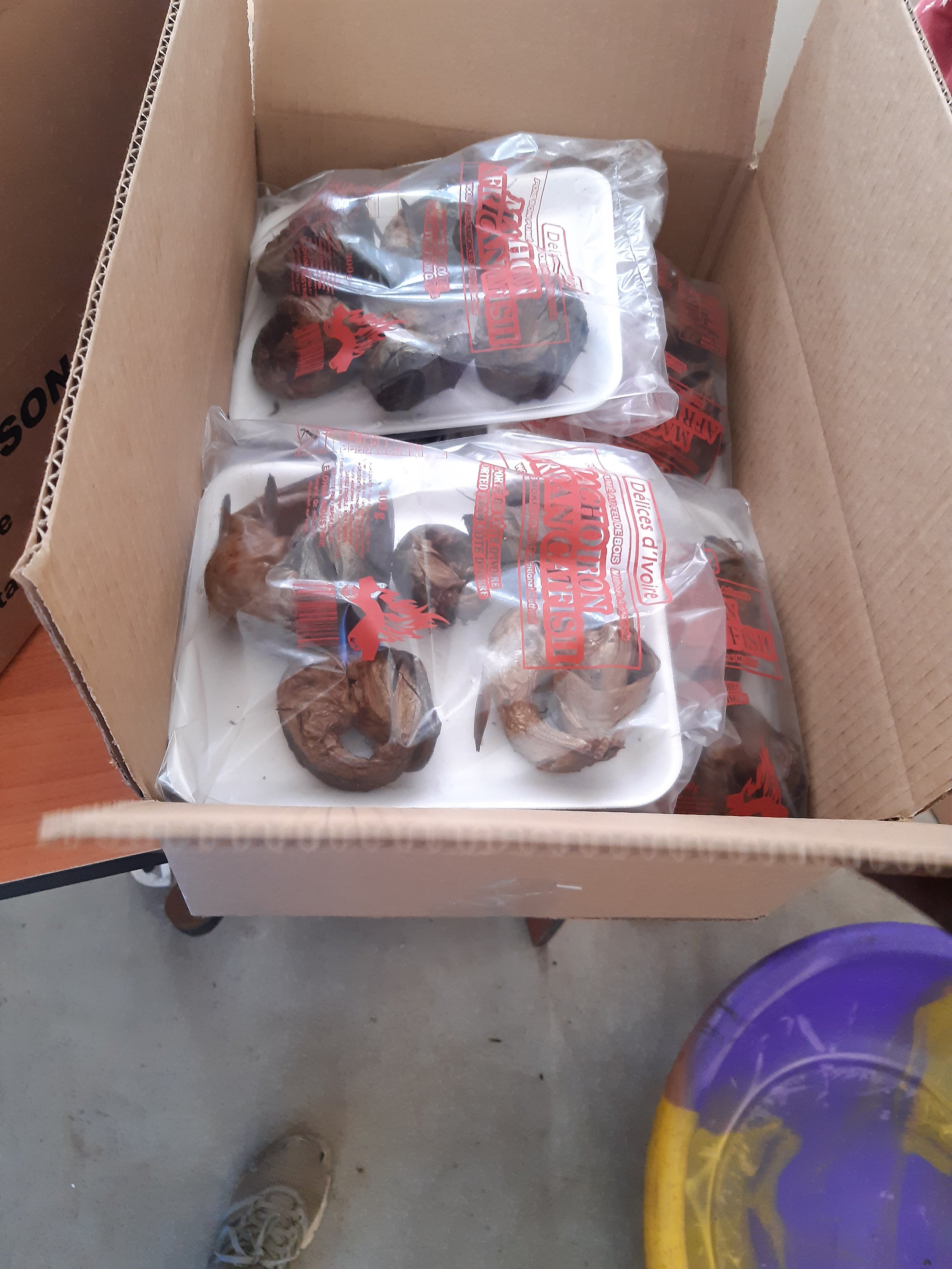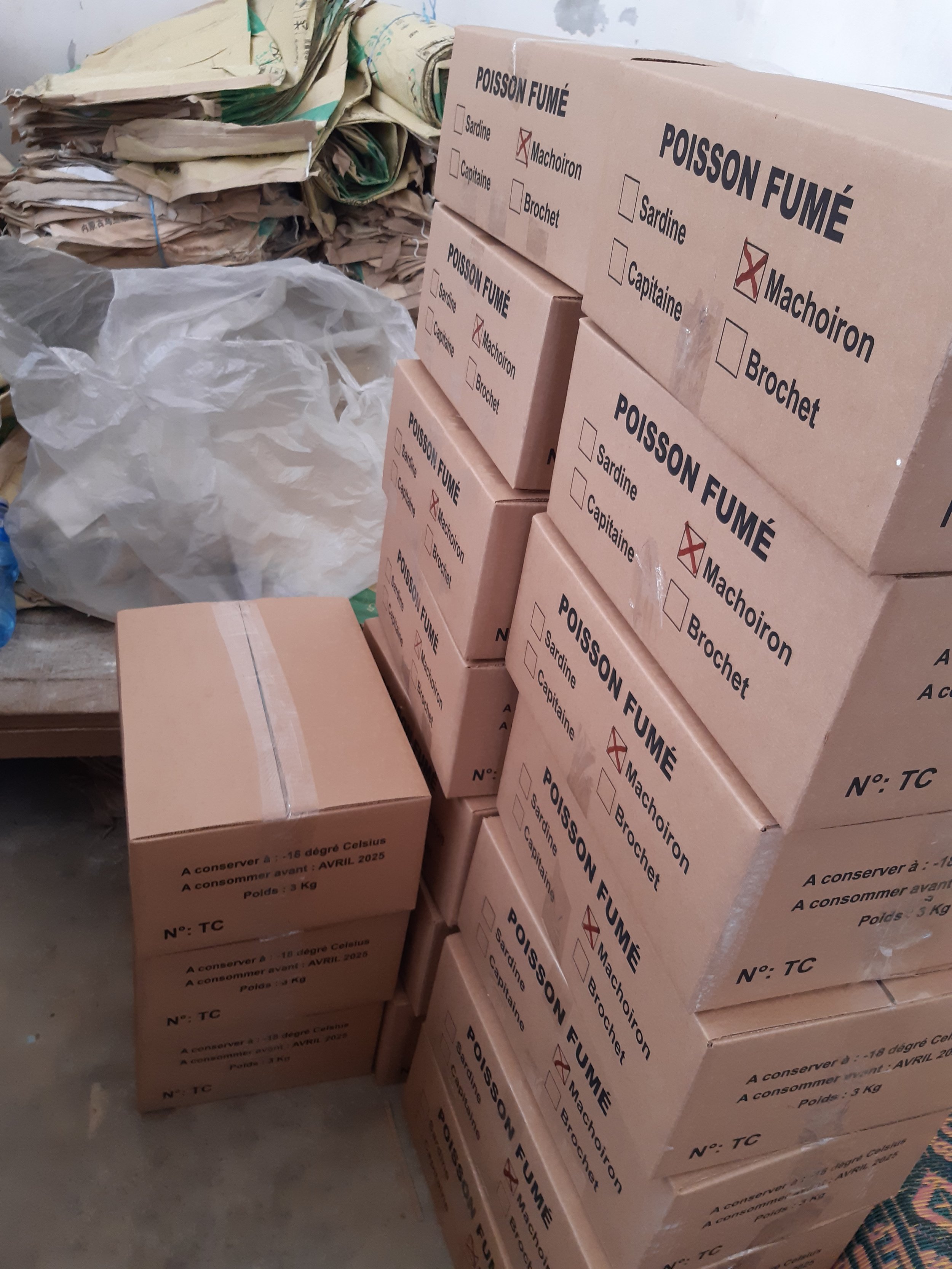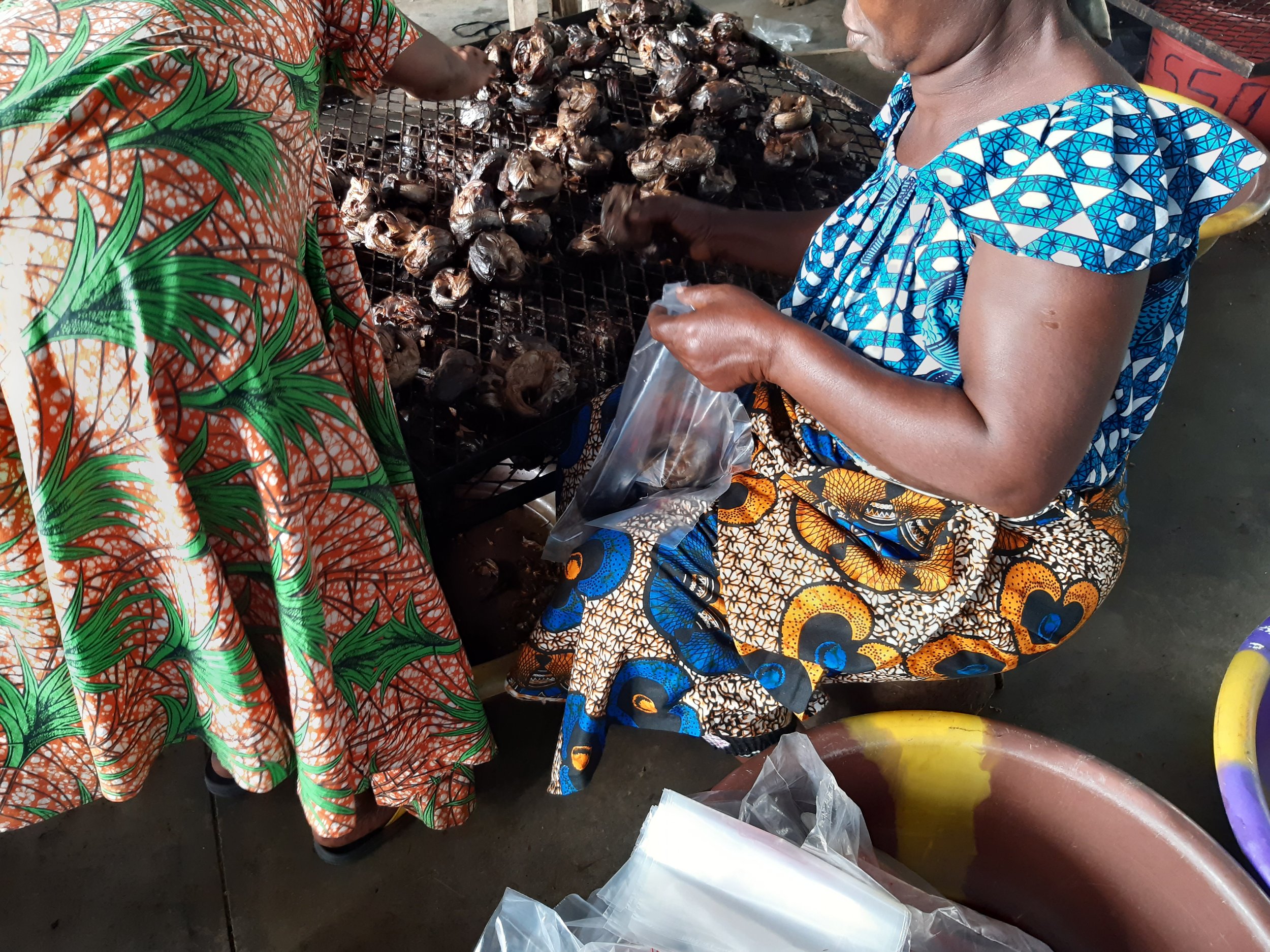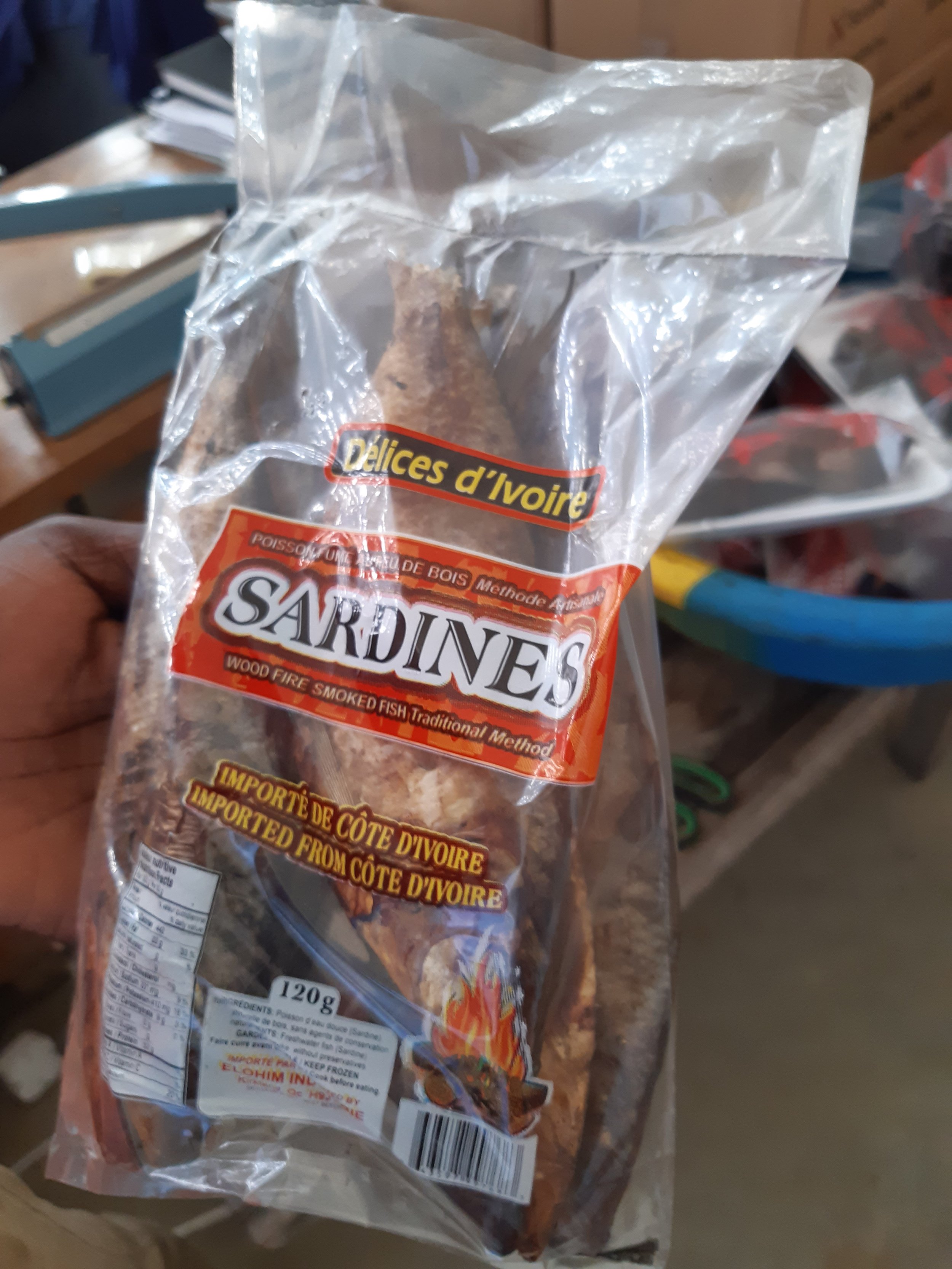An article by Andréa durighello
Andréa Durighello spent several years in Côte d'Ivoire, where she worked closely with artisanal fisheries stakeholders, in particular women's cooperatives. She became aware of the challenges facing the artisanal fisheries sector while participating in the development of the Fisheries Transparency Initiative (FiTI), and has continued to be involved in the sector ever since. She regularly participates in the steering committee of the Coalition for Fair Fisheries Agreements (CFFA).
It is a Saturday morning at the landing site of Locodjro in Abidjan. Today, there is no fish arriving for the women fishmongers at the landing site, but they are there...
Sitting on the old freezers that they use as iceboxes to preserve the fresh fish they buy from the artisanal fishermen, they are perfecting their latest innovation: a group purchasing mechanism for the acquisition of fish, coupled with a self-financing model for their cooperative.
This system, designed and managed by the women of the CMATPHA cooperative, gives them a chance to buy from the tuna boats that sometimes return from their fishing trips with several tonnes of fish. At each landing, the fishermen sell their catch in one go. Either the women buy everything or they buy nothing, and these fishermen do not take credit. While a ton of tuna can fetch up to two million CFA francs [Ed. approximately 3,000€], the cash requirements for dealing with fishermen are beyond the means of most women in the cooperative. Together, raising the necessary funds becomes possible. Finding common solutions to the individual challenges faced by women fishmongers and fish processors is what motivated some thirty women operating on the Abobo Doumé site (in the commune of Attécoubé, 10 km from Plateau, Abidjan's business district) to form an association (Association des Vendeuses de Poissons Frais et Fumés d'Abobo-Doumé - AVEPFFA) in 2009. Access to sufficient funds to carry out their activity is one of the main challenges faced by women in artisanal fisheries.
“Given the conditions in which women work, and the difficulty of accessing health services, falling ill or being injured at work is a permanent sword of Damocles.”
AVEPFFA, which has since become the cooperative of fishmongers and fish product processors in Abidjan with a Board of Directors (COOP-CA-CMATPHA), is an example of the importance of women in artisanal fisheries joining together in associations. Although women are present at all stages of the artisanal fisheries sector, their work remains informal, and they are invisible and marginalised, with limited access to basic services such as credit, insurance and housing.
In Côte d'Ivoire, some fishmongers and processors, but also young people, can be seen sleeping on processing and landing sites. Given the conditions in which women work, and the difficulty of accessing health services, falling ill or being injured at work is a permanent sword of Damocles. This is particularly the case for women who smoke fish using traditional ovens, and who are exposed to toxic fumes, sometimes with their children tied behind their backs. Last year, in 2022, one of the women smokers in Abobo-Doumé died due to health problems related to smoking. "Bloodshot eyes" is what finally convinced Léonie, a member of the CMATPHA cooperative, to switch to fishmongering.
In 2017, after a year-long survey of traditional smoking sites, researchers from the University of Félix-Houphouët-Boigny in Abidjan revealed that 50% of the women using traditional ovens were suffering from respiratory illnesses and that 10% of them had lost their fingerprints as a result of manually turning the fish in the oven. In the face of these challenges, coming together represents a potential to address some of these shortcomings collectively.
SOLIDARITY IN THE FACE OF LIFE'S CONTINGENCIES
Without access to social or medical services, each illness or death is a burden that women must bear alone. From Abidjan to Grand-Béréby, via San Pedro, cooperative societies have created a "social group" which manages a solidarity fund to help women in difficult and happy times. Thus, at each death, birth or marriage, the members contribute to support the members concerned and their families. In Abidjan, this solidarity remains a founding value of the cohesion of the CMATPHA cooperative, whose members are today spread over three sites, the main site of Locodjro and the two sites of Abobo-Doumé and Yopougon Santé. According to the latter and despite their distance from Locodjro, this principle of solidarity is the main reason why they remain members of the cooperative.
By intervening where public or private services are absent, women's organisations play an essential role as a social safety net. This is in line with the conclusions of the International Labour Organisation (ILO), which considers the cooperative movement as a model to contribute to sustainable development and poverty reduction. In the context of women in artisanal fisheries, this is even more relevant, as women workers in the sector are often on the margins of political decisions, preventing them from having their interests heard in public policy.
By associating in cooperatives or groups, women have the possibility to autonomously apply their own values and principles to respond to the issues that affect them. In Côte d'Ivoire, one of the driving forces behind the creation of the Union des Sociétés Coopératives des Femmes de la Pêche et assimilées de Côte d'Ivoire (USCOFEP-CI), spread throughout the country, was to ensure the well-being and cohesion of its members. With this in mind, the Union has developed a social policy that extends to all areas of life. In 2021, the Union even went so far as to sign an agreement with a real estate company for the construction of social housing, which should enable the women of the Union to improve their living conditions by gaining access to decent housing. "A fishmonger, a roof" is the objective of this project carried out by the USCOFEP-CI to improve the living conditions of women in artisanal fisheries and their families.
GENERATING NEW OPPORTUNITIES
Beyond the solidarity aspect that underlies the relations between women fishmongers and fish processors in Côte d'Ivoire, they have also been able to rely on the cooperative to implement solutions to needs common to all members. The group purchase mechanism defined by the women of CMATPHA to generate sufficient funds for the acquisition of tuna is a perfect example.
To ensure a sustainable mechanism, the women also agreed on a system of contributions on purchases and resales, allowing them to acquire equipment and basic inputs (basins, salts, packaging or "kakis") that will be rented or sold to the women of the cooperative. The provision of services to members is one of the key principles of a cooperative, which according to the definition of the International Labour Organisation (ILO) is constituted on the principle of "meeting the common economic, social and cultural needs and aspirations" of its members.
EXPERIENCE SHARING AND CAPACITY BUILDING
For USCOFEP-CI, the vision of a Union is also to pull each other up. This includes supporting internal capacity building and the development of new skills and innovations, in line with the cooperative guiding principle of internal member training. Well-structured organisations can ensure a wide dissemination of innovations and skills within the sector. This is the strategy adopted by USCOFEP-CI, which regularly brings in representatives of its member cooperatives from all over Côte d'Ivoire to take part in meetings and training sessions, with a view to ensuring that the information is then passed on to their base. By relying on legitimate and trusted intermediaries who can ensure that information is transmitted in a way that is adapted to the context in which the women live, to local languages and to the capacities of each woman, such structures support inclusion and the fight against the marginalisation of women on a large scale.
For USCOFEP-CI, one of the challenges is to raise awareness among its members about the use of improved FTT ovens for smoking fish. For this, the Union relies on the expertise developed by a core group of women who have benefited from training by several technical partners in the past, such as the FAO and the Interprofessional Fund for Agricultural Research and Advice (FIRCA) of Côte d'Ivoire. With the expertise of its members, USCOFEP-CI has the potential to extend such training services beyond the Union. Indeed, the Union and some of its cooperatives have already been approached by external structures to train other women in the use of improved stoves in the south-east of Côte d'Ivoire.
At the end of the day, it is the chance for such groups to make the greatest number of people benefit from study trips and experience-sharing networks, such as those carried out by the African Confederation of Artisanal Fisheries Professional Organisations (CAOPA), one of whose objectives is to promote women in the sustainable management of fisheries, or the African Women Fish Processors and Traders Network (AWFISHNET), a network of women fish processors and traders in Africa.
From the point of view of public authorities and technical partners, the associations represent a key partner for leveraging initiatives to support the artisanal fisheries sector. By reinforcing trickle-down mechanisms beyond one-off capacity building programmes, which often benefit the same leadership figures, partners engaged with women in artisanal fisheries can reinforce the effectiveness of their action, while ensuring cohesion within the organisations.
The women of the USCOFEP-CI already play this role, as their vision is to contribute to the autonomy and well-being of all women in the artisanal fishing sector. Perceiving their role as advisors, the women of the Union also receive women from outside the cooperative, whom they do not hesitate to advise.
ASSOCIATING TO PROFESSIONALISE
In the artisanal fisheries sector, as in other primary sectors in developing countries, a distinction is often made between economic groups formed by women and men. Côte d'Ivoire is no exception. While men are often referred to as cooperatives (or cooperative societies), women's groups are more likely to be considered as associations. This is no small nuance. This difference in status is crucial for women and their aspirations as economic agents. In Côte d'Ivoire, as in other countries where the cooperative movement is supported by the State, a legal framework grants cooperative societies a dimension of real economic actors, since cooperative societies in Côte d'Ivoire are treated as commercial companies.
“By evolving from an association to a cooperative society, it allowed women to be treated as real economic actors, which greatly advanced the rights of women in artisanal fisheries.”
By evolving from the Association des Vendeuses de Poissons Frais et Fumé d'Abobo-Doumé (AVEPFFA) to the status of a cooperative society with a Board of Directors under the OHADA Uniform Act in 2015, the first women's cooperative in the sector to be created, the women of CMATPHA have made a breakthrough for the rights of women in artisanal fishing.
The creation of the cooperative society has enabled women to take a decisive step from informal to formal. A cooperative society under the OHADA regime is required, among other things, to produce annual activity and financial reports, which women's cooperative societies can use to demonstrate their credibility to commercial partners. In Côte d'Ivoire, USCOFEP-CI hired a chartered accountant to prepare the financial statements of the Union. With these balance sheets in hand, USCOFEP-CI was able to apply for a loan from a micro-credit institution.
This formalisation opens the way for women in the sector to opportunities with a significant potential socio-economic impact, and allows them to value their work and know-how. And there is demand for them. Back at the Locodjro landing site, the women of the CMATPHA cooperative are filling boxes of pike, smoked in the FTT ovens, an order from a buyer for custom smoking, destined for export. The quality of the smoked fish that comes out of the Locodjro ovens is appreciated as far away as Canada [Editor's note: See image gallery below]. The objective of the women of CMATPHA is to acquire an export certificate for fishery products for the cooperative, in order to be in charge of all aspects of the process, from fish trade to export, and to conquer new markets.
To support women in realising this potential, the help of the government and partner organisations is crucial. At its inception, AVEPFA and later CMATPHA were able to rely on the Direction des Organisations Professionnelles et de l'appui au Financement (DOPAF) [Ed. the department of professional organisations and funding support], the Direction des Pêches [Ed. fisheries department], as well as other affiliated state institutions of the Republic of Côte d'Ivoire. At the time, these institutions encouraged the pioneering role of the women of the cooperative. They also received help in meeting the standards of the OHADA Uniform Act, as well as assistance from international organisations. Such support is beneficial and should inspire people beyond the borders of Côte d'Ivoire.
MAKING WOMEN'S VOICES HEARD
While the celebration of International Women's Day on 8 March reminds us that women, although present at all stages of the artisanal fisheries value chain, still suffer from insufficient recognition of their socio-economic contribution, the example of the cooperative societies in Côte d'Ivoire shows the capacity of women's organisations to enable their members to assert themselves as credible economic actors. The initiatives taken autonomously by these organisations also demonstrate the strength of women's proposals to respond to the issues that affect them.
However, today, women in artisanal fisheries are still largely excluded from decision-making processes. Promoting the empowerment of women to enable them to participate in decision-making and assume responsibilities for the sustainable exploitation of fisheries resources is the objective advocated by the "Voluntary Guidelines for the Sustainability of Small-scale Fisheries in the Context of Food Security and Poverty Eradication", an objective that women's organisations can help achieve.
In any case, this is the dynamic in which the cooperative societies of USCOFEP-CI are involved, with some notable successes, such as when a joint plea with the Fédération Nationale des Sociétés Coopératives et Acteurs de la Filière Pêche de Côte d'Ivoire (FENASCOOPCI) led to the invitation of representatives of the Federation to the negotiating table for the renewal of the fisheries agreement between the European Union and Côte d'Ivoire in 2018 ; or when USCOFEP-CI participated in the planning of the infrastructure of the Locodjro landing site, pushing for the construction of a day care centre for the children of women fishmongers and processors.
In 2020, it was again the USCOFEP-CI that took the initiative to create the first open door days for fishing products in Côte d'Ivoire. This joint commitment has done much to increase the visibility of women in the artisanal fisheries sector and the sector as a whole.
Women in artisanal fisheries are a pillar of the sector, 365 days a year. Even today, however, there needs to be a day set aside for them to remember this. By choosing Côte d'Ivoire to celebrate International Women's Day 2023, CAOPA is offering women's cooperative societies in Côte d'Ivoire the opportunity to share their experience with representatives from across Africa. This event also reminds governments and technical partners of the potential of women to help promote a sustainable and inclusive fisheries sector.
To realise this potential, it is incumbent on governments, in Côte d'Ivoire as elsewhere, to facilitate an enabling environment for women in artisanal fisheries, both to give women the tools and technologies to create opportunities and implement innovations, and to promote women as agents of change. This includes supporting pan-African and international processes aimed at enhancing the role of women in the artisanal fisheries sector in Africa, including the Voluntary Guidelines for Sustainable Artisanal Fisheries and initiatives such as the African Women Fish Processors and Traders Network (AWFISHNET), by empowering women to actively contribute to them, while ensuring inclusive processes.
The easiest way to do this is to go and meet them and let them speak for themselves about the challenges facing women in artisanal fisheries and the solutions they propose. On this 8 March 2023, you may not find them behind their freezers, as it is a holiday, but a large number of them will certainly have travelled from all over Côte d'Ivoire to Abidjan: like Bathilde, Charlotte, Elizabeth, Gisèle, Léonie, Marie-Angélique, Micheline, Monique, Naya, Simone, Télagine, Viviane, Yamissa, Débora or Eliane. Although they do not all come from the same organisations, these women share the same vision: that of contributing to the autonomy and well-being of all women in the artisanal fishing sector. And that to go far, you have to be together.
Banner photo: Monique Benie Niamke and the women of the Société coopérative des femmes Mareyeuses Grossistes et Détaillantes of San Pedro, by Rich Press. Another photo of Ms Tah is also by Rich Press. The rest of the photos in this article are reproduced with the permission of USCOFEP-CI and/or Andréa Durighello.















Climate change is transforming the environmental and social landscapes of African coasts. While small-scale fishing communities are suffering first hand the impacts of climate change, they are also developing community-led and nature-based solutions to adapt and become resilient. In this article, the author goes through some examples and gives recommendations on how the EU can support these initiatives.